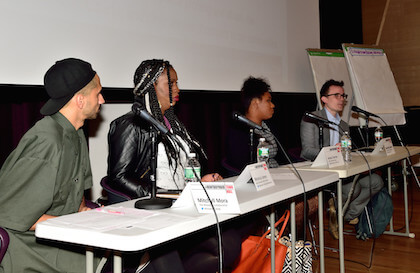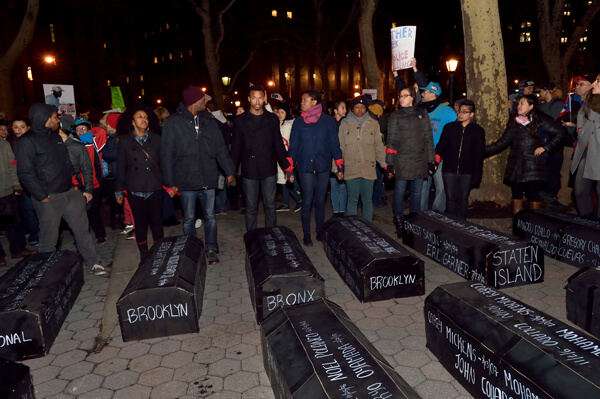BY ANDREA RITCHIE | What do marijuana arrests, illegal gender searches, and the use of condoms as evidence all have in common?
All are the product of discriminatory policing practices affecting LGBTQ communities, and particularly LGBTQ youth and transgender people of color.
They also often take place during searches supposedly based on “consent.”
The scene, described by countless New Yorkers, legislators, and even former Police Commissioner Ray Kelly, goes something like this: an officer approaches, asks for ID, and orders a person to empty their pockets, open up their bag, maybe lift up their shirt, or, worse yet, drop their pants. Often, it ends with the person pulling less than 25 grams of marijuana out of their pocket into plain view, bringing the associated charge into the realm of a misdemeanor instead of a violation. More than 80 percent of the time the subject is a young Black or Brown person — making these kinds of searches one of the many ways LGBTQ youth of color are swept into the criminal legal system.
When there is no other legal justification for a search in the first instance — such as a reasonable belief that a person is armed, probable cause to believe a crime has been committed, or a warrant — the search is considered a “consent” search.
Sometimes there are variations on the theme — the item found in a pocket or purse is a condom and the charge is loitering for the purpose of prostitution. At a City Council hearing earlier this year Streetwise and Safe (SAS) youth leader Trina described being stopped and searched:
The dispatcher told her that my record was clear but instead of letting me go, she said she wanted to see in my purse. I didn’t know my rights then or I would have not consented to the search. I thought I had to show her the contents of my purse. When she looked inside, she saw two condoms. She called the precinct back and asked for a police car to come. I asked her, “Why are you locking me up? I can’t carry condoms?” She replied, “You are getting locked up for prostitution.”
Sometimes, the order is to lift up your shirt or open up your pants, given by an officer who is illegally trying to assign gender based on anatomy or simply harassing transgender and gender nonconforming New Yorkers. That officer will later argue that the search was based on consent.
No matter what the script, uninformed, presumed, or forced “consent” is the legal justification for the search when no other exists.
Many people know they have the right to refuse a search where there is no other legal basis. Many don’t. Many more don’t feel empowered to exercise that right when surrounded by armed police officers.
The Right to Know Act — introduced earlier this month by out gay Bronx City Councilmember Ritchie Torres and his Brooklyn colleague Antonio Reynoso — would change that. In these scenarios, New Yorkers would be informed of their right to refuse or withdraw consent if there is no other legal basis for a search, and given the opportunity to provide voluntary, informed consent — or exercise their constitutional right to refuse it. It would also require officers to identify themselves and give a reason for initiating law enforcement action.
Reading people their rights to refuse consent searches would interrupt the dynamic of assumed or forced “consent.” Obtaining recorded proof of voluntary and informed consent would ensure that anything found was lawfully recovered.
For LGBTQ youth of color caught up in the NYPD’s marijuana arrest dragnet, it would offer an opportunity to stop an officer’s order to empty pockets from starting a chain reaction of consequences that can range from losing a job to losing public housing to losing financial aid.
For LGBTQ New Yorkers who don’t know about the NYPD Patrol Guide’s new provisions explicitly banning searches to assign gender, the Right to Know Act would provide another opportunity to reclaim rights and dignity during police interactions. It would also help ensure that LGBTQ people are able to protect themselves by carrying condoms, without fear that an order to open up your purse will result in police harassment, confiscation of condoms, or, worse, arrest.
Police unions have responded by attempting to whip up panic and hysteria based on inaccurate readings of the statute and misstatements of the law. For one, the Right to Know Act explicitly says that would not apply where an officer has a reasonable suspicion that a person is armed. It would therefore not interfere with officers’ safety or ability to protect themselves. Secondly, the NYPD’s own data reveals than guns are recovered in fewer than one percent of all frisks and searches. Except in extremely rare cases, consent searches are simply not how guns are found.
Colorado, Cincinnati, and Pittsburgh have all adopted similar — and in some cases, stronger — policies, without any increase in gun violence. The US Department of Justice — the highest law enforcement agency of the land — has given the language of the Right to Know Act a stamp of approval in a consent decree with the New Orleans police department, making regulation of consent searches a gold standard of law enforcement practice.
In fact, Dr. James Fyfe, the NYPD’s former deputy chief in charge of training, testified in favor of completely banning consent searches in New Jersey, calling them “ineffective and a waste of time.” New Jersey followed his advice, joining with Rhode Island, California, Minnesota, and Hawai’i to ban consent searches altogether based on their racially discriminatory application and impacts — again, without any increase in gun violence.
The Right to Know Act simply requires police to give the equivalent of a Miranda warning before conducting otherwise baseless searches and to get the individual’s consent on record.
As the nation struggles with absence of accountability for the murder of Mike Brown in Ferguson, this legislation would offer a critical opportunity to change the way police interactions go down in New York City, increase transparency and accountability in police practices, and reduce criminalization of Black and Brown youth, including LGBTQ youth.
As SAS campaign staffer Chris Bilal said at the legislation’s introduction — “We’re not asking for streets paved with gold. We’re simply asking for the right to know.”
Andrea Ritchie is coordinator at Streetwise and Safe, which works to help LGBTQ youth of color navigate the challenges and risks of police encounters.

































